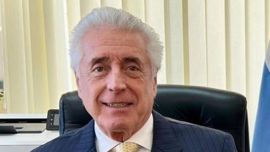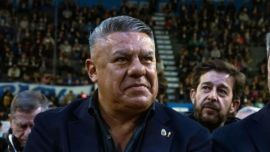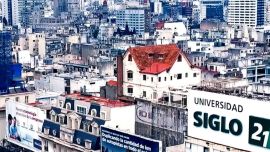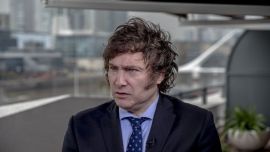Argentina’s government has been strongly criticised by two leading international human rights groups over its refusal to condemn human rights violations and the arrest of opposition presidential candidates in Nicaragua.
Representatives for Human Rights Watch and Amnesty International slammed the Alberto Fernández administration’s failure to back a resolution from the Organisation of American States (OAS) on Tuesday expressing concern at the deterioration of the political climate in the Central American nation.
Over the past few weeks, more than a dozen opposition figures have been arrested in Nicaragua, including four declared presidential rivals who planned to run against President Daniel Ortega in the next election. The executive president of the nation's largest private bank was also arrested for "inciting foreign interference."
Human rights groups have accused the Ortega regime of attempting to freeze out its political opponents, which Nicaragua claims are "usurpers" funded by the United States.
On Tuesday, a resolution issued by the OAS condemned the arrest of presidential pre-candidates, restrictions imposed on political parties and called for the immediate release of political prisoners.
A total of 26 nations – including the United States, Chile, Colombia and Peru – voted in favour, with Nicaragua, Bolivia and Saint Vincent and the Grenadines voting against.
Despite expressing "concern about the recent events in Nicaragua" in a statement, Argentina chose to abstain, joining Belize, the Dominican Republic, Honduras and Mexico.
Argentina's Ambassador to the OAS, Carlos Raimundi, justified the move by saying the resolution amounted to interference in Nicaragua's internal affairs.
“We are convinced that this situation will be overcome by the Nicaraguans themselves,” said Raimundi, “safeguarding peaceful coexistence, division of powers, respect for minorities, constitutional guarantees and full respect for human rights in general.”
Speaking to the NTN24 news channel on Thursday, José Miguel Vivanco, the Americas director for Human Rights Watch, described that decision as "an embarrassment," bemoaning that "two very important Latin American democracies have refrained from condemning facts that, evidently, constitutes a violation of human rights and the most elementary rules of representative democracy."
‘Unacceptable’
Amid fierce criticism from the opposition, Argentina's Foreign Ministry later sought to clarify its stance.
"We do not agree with the countries that, far from supporting the normal development of democratic institutions, set aside the principle of non-intervention in internal affairs, [which is] so dear to our history," read a statement, which was co-signed by Mexico. "Imposing guidelines from outside," it warned, could "unduly prejudge the development of electoral processes."
Vivanco, however, said that argument was “nonsense,” adding that “anyone who is minimally aware of what is happening there is aware that Ortega and his wife, [Vice-President Rosario] Murillo, concentrate power in their hands."
In a statement, Amnesty International said it "regretted" Argentina's "unacceptable" decision, with the NGO’s Americas Director Erika Guevara Rosas declaring that "the principle of non-intervention in the internal affairs of a State does not apply to human rights violations and crimes under international law."
“It is regrettable that three years on from the beginning of one of the worst human rights crises in Nicaragua, there are still dissonant positions in the international community,” she added. “We call on the governments of the hemisphere to unite their voices to end the repression in Nicaragua.”
The decision not to support the resolution is the latest in a series of international and diplomatic votes on human rights issues that have been criticised by Argentina’s opposition parties.
In March, Argentina told the International Criminal Court (ICC) it was withdrawing its support for efforts to prosecute Venezuelan President Nicolás Maduro for alleged human rights abuses, preferring to promote efforts to end the crisis in the country via "inclusive dialogue which does not favour any particular sector."
Last December, Buenos Aires also refused to back a resolution from the OAS which would have condemned recent elections in Venezuela as "fraudulent."
The government has faced criticism for its stance on the Middle East conflict, after it backed a United Nations vote calling for an investigation into "alleged violations of human rights in Israel and the Gaza Strip.”
‘Silent’
On the domestic front, former president Mauricio Macri slammed the decision to abstain, accusing the government of "looking the other way" while human rights violations were ongoing.
"Once again, Argentina is silent in the face of human rights violations. In this case abstaining from voting at the OAS to condemn the Ortega regime that has arrested, among others, four candidates for the Presidency," wrote the opposition leader in a post on Twitter.
Former foreign minister Jorge Faurie, who served in Macri's 2015-2019 administration, described the decision as "an error and a tragedy," arguing that it ran contrary to Argentina's long history of denouncing human rights violations.
"We have completely abandoned that path," said Faurie on Wednesday, referencing recent votes on Venezuela and the Middle East conflict. "First by withdrawing from the complaint against Venezuela for human rights violations, and now by voting against the consensus of 26 countries."
"This leaves us on the side of dictatorships, autocracies and those who do not respect human rights," he declared.
“I believe that the government's decision does not represent the Argentines who voted for any of the parties that ran in the 2019 elections, those who want to live in freedom, who want to be respected for the ideas they may have and not for that reason become prisoners," the former official told CNN radio.
There were even murmurings of discontent from some figures in the ruling coalition. Lower House Speaker Sergio Massa, speaking during a trip to Washington, said that it was impossible "to tolerate political prisoners" in Nicaragua or any country in Latin America.
The Ortega regime has given no indication that it plans to heed the criticism. Five more opposition figures were detained last Sunday, including four top figures from the Unamos opposition party — including party president Suyén Barahona Cuan, vice-president Hugo Torres, ex-guerilla fighter Dora Maria Téllez and Ana Margarita Vigil Guardián, a police statement said.
The government said the group had been detained on charges of "inciting foreign intervention" by the United States.
Unamos, formerly known as the Sandinista Renewal Movement (MRS), is made up largely of dissidents who split from Ortega's Sandinista National Liberation Front (FSLN) because they disagreed with his leadership.
The charges stem from a law initiated by Ortega's government and approved by Parliament in December that were allegedly imposed to "defend Nicaragua's sovereignty."
The opposition figures received "millions of dollars in cash from the American public though USAID," the government alleged in a document.
Julie Chung, the top US diplomat for Latin America, called the arrests "arbitrary" and denounced Ortega's "campaign of terror" in a tweet.
"OAS members must send a clear signal this week: enough repression. The region cannot stand by and wait to see who is next," she added, in comments issued prior to Tuesday's vote.
Ortega's government and inner circle have been subject to US sanctions since a clampdown on demonstrations demanding his resignation in 2018 claimed at least 328 lives, according to rights groups.
Ortega, a father of 15, governed Nicaragua from 1979 to 1990, before returning to power in 2007. He has won two successive re-elections since then. Now 75, he is accused by the opposition and NGOs of increasing authoritarianism. The veteran leader is widely expected to seek a fourth term in elections due November.
– TIMES/AFP/NA























Comments